Clearing plastic from the world’s coastlines
Hundreds of thousands of volunteers stepped up to help clear the world’s coastlines of plastic waste as part of the Ocean Conservancy’s recent International Coastal Clean-up this autumn. The annual clean-up event is the world’s largest single day volunteer effort to remove rubbish from local waterways, beaches, lakes and rivers.
This year, volunteers used an Ocean Conservancy app to document every piece of rubbish collected, logging it in the Ocean Trash Index, the world’s largest marine debris database. Some 11.5m volunteers have logged 225m items removed from beaches and waterways over the past 30 years.
Plastic ocean waste is harmful to marine environments and wildlife, and has already harmed nearly 700 species of wildlife. Every year, an estimated 8m tonnes of plastic waste flows into the ocean, the majority of it discarded by people on land. Without strong global action, the volume of plastic in the world’s oceans could soon equal the volume of fish, prompting significant environmental, economic and health issues.
“Marine debris is a serious concern for the health of our oceans,” says Allison Schutes, who manages Ocean Conservancy’s ‘Trash-Free Seas’ programme. “Fortunately, this is a problem that we can solve,” she adds, highlighting that through the clean-up event, the Ocean Conservancy gains a glimpse of the many people across the world working towards cleaner oceans.
“Recycling more plastic is vital to stemming the flow of plastic waste into the world’s oceans,” says Richard McCombs, MBA’s CEO. “By transforming post-consumer plastics into secondary raw materials, we are giving plastic waste a new lease of life and preventing it from becoming marine debris.”

